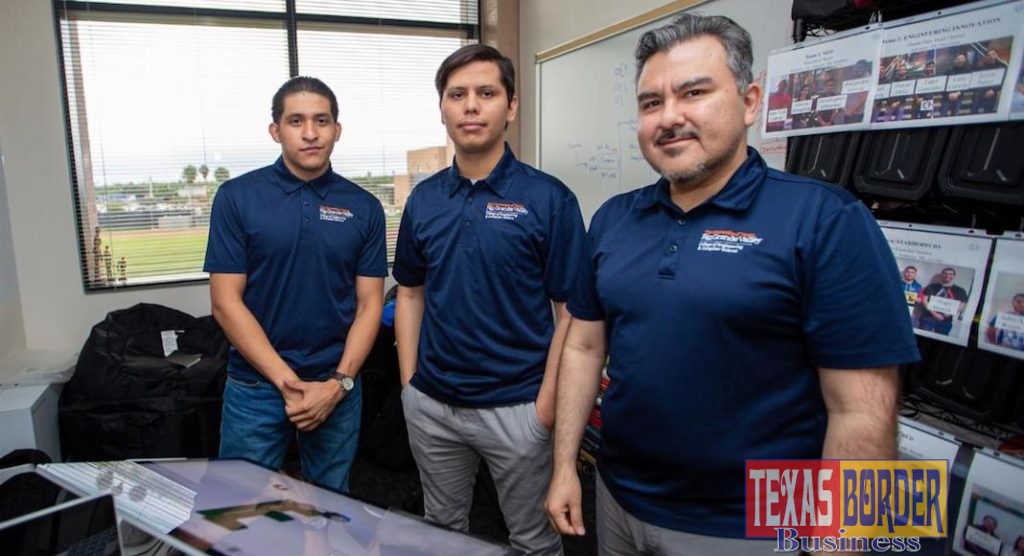Texas Border Business
By Maria Elena Hernandez
RIO GRANDE VALLEY, TEXAS – UTRGV graduate student Ruben Garcia is focused on learning about the medical and business fields for a project. But he isn’t earning a graduate degree in medicine or business; he’s a student in the UTRGV College of Engineering and Computer Science.
“This is completely new to me, so it’s very exciting,” said Garcia, a Pharr native.
Garcia is working on a project called Vaquero Boot – a device being designed to provide therapy for hip and knee replacement patients after surgery. The boot would prevent blood clots by stimulating muscles around the ankle and foot to encourage blood circulation.
He is designing alongside David Barrera, of Weslaco, a senior in the UTRGV Robert C. Vackar College of Business & Entrepreneurship who worked to understand the technical part of the project.
Both UTRGV students were developing the device as part of a multidisciplinary team for the National Science Foundation Innovation Corps Life Sciences Regional Program at MD Anderson Cancer Center.
“The objective of the program is to translate research and projects from academia into practical products and companies,” said Dr. Noe Vargas Hernandez, a UTRGV assistant professor of mechanical engineering and member of the Vaquero Boot team.
The group, which also included UTRGV assistant professor of mechanical engineering Dr. Javier Ortega, attended a kickoff for the program in Houston last fall. They participated in webinars in the weeks following, then returned to Houston to present the results of their work.
NEW PERSPECTIVES
Vargas Hernandez said the first order of business for designing the product is to understand the problem “really, really well.”
“The I-Corps program teaches you to do exactly that, to talk to the customer and to understand who the stakeholders are,” he said.
That meant getting out of the lab, and out of the building. For mechanical engineering student Garcia, it was a drastic change.
“It really got me out of my comfort zones and into learning things that I never really thought I would have learned before,” he said.

As an undergraduate, he worked in his own little space.
“You make a lot of assumptions about how things should be, but you don’t really learn what they really should be until you speak to the real customers,” Garcia said.
As part of the I-Corps program, teams learned about business model development and the customer development process.
“We’ve been trying to pinpoint the customer segments, and to find out through the interviews we do with them the specific problems,” said Barrera, who focused on the business aspects of the project.
The I-Corps program was demanding, he said, but he appreciated the opportunities to interview specialists and professionals for the project.
“It’s the best way to learn – hands on – so I’ve been able to learn a lot from this program,” Barrera said.
The UTRGV senior said that, while he felt he struggled with understanding the technical side, he also recognized the importance of being well-versed on all aspects of the project.
Vargas Hernandez said the project is an excellent example of multidisciplinary collaboration.
“We have engineers. We have business,” he said. “And we’re going to bring in other areas. We also want to interact with the School of Medicine to help us. The more, the merrier, and the better the final product.”
The Vaquero Boot is still years away from completion or from being licensed to a company. However, Dr. William Head, the orthopedic surgeon who first approached the UTRGV College of Engineering and Computer Science with the idea, is already running tests to check the feasibility of the technology.
Related Link: Dr. William Head gifts UTRGV School of Medicine first major contribution
Garcia, the mechanical engineering graduate student, said he feels the project validates his work.
“I’m actually doing something that’s going to impact people, and that really drives me and gives me purpose,” he said.
For more information about the engineering and business programs, as well as other areas of study at the university, visit UTRGV.edu.



















